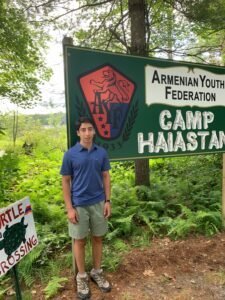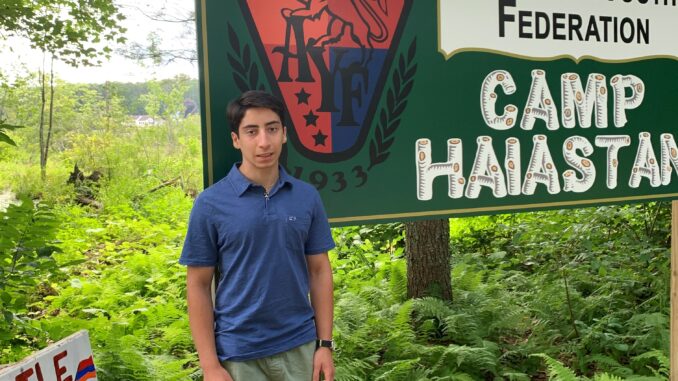
Deep in the woods of Franklin Massachusetts lies “the greatest place on earth,” Camp Haiastan. Armenian parents send their children to camp for two or more weeks over the summer from all over the world so they can spend time with other Armenians. Every day the camp hosts what they call Hye Jahm, or Armenian hour, when campers learn about the Armenian Revolutionary Federation, Armenian history and current events in Armenia. Hye Jahm can be the least enjoyable activity for many campers, but for me, it was transformative. Before my stay at camp in 2022 I had little knowledge of the 2020 Artsakh War and the threats looming over Armenia and Artsakh. Thanks to the Hye Jahm teachers who explained the dire situation in Artsakh, I became interested in following Armenian news. Since then, I made it a habit to read the news on the car ride to school.
When the teacher of my school’s Broadcast Journalism Club offered students the chance to work on personal projects, I immediately thought of the 2020 Artsakh War and the then-recent clashes in September 2022. That day I told my mother about my vision while she drove me home from school, and she said it would be a very difficult feat. Previously I had only worked with video editing, but not with creating content. I proceeded to write a history briefing and a breakdown of the 2020 war and war crimes committed by Azerbaijan as the basis for my script.
This project required approval from the school before I could continue. When I met with two representatives from the Broadcast Journalism Club, they said that my content sounded very biased and radical and would not be approved by the school. They said it would be nearly impossible to get approval for my project, and I would need to interview someone from the region who speaks English and has seen the carnage in Artsakh, as well as someone with political importance. I went home that day determined to prove the disbelievers wrong.
I shared what I had learned with my mother who encouraged me to pursue my interest. For about two weeks I sent out numerous emails. I wrote to influential Armenians to see if they knew anyone who met my criteria for an interviewee or who could give me guidance. I got many rejections, and most of my emails went ignored. Finally, in January, the President of the Manhasset School Board, a fellow Armenian, wrote back to me and gave me the contact information of Arda Haratunian, a strategic communications advisor and educator.
Mrs. Haratunian provided me with a lot of media knowledge and guidance. She helped me organize my interview questions and kept me in focus. She put me in contact with Zohrab Mnatsakanyan, the former Minister of Foreign Affairs of Armenia and the former Representative of Armenia to the United Nations. He was kind enough to grant me my first interview, which took place via Zoom from across the world in Yerevan, Armenia.
I then needed to interview someone who could give me an eyewitness account from Artsakh. After knocking on many doors for several weeks I came up empty-handed. As the school year was nearing an end, I found the breakthrough I needed. In April, I called the Armenian National Committee of America (ANCA) and connected with Elizabeth Chouldjian. She put me in contact with Gev Iskajyan, the ANCA representative in Artsakh. He was the perfect person to interview for my documentary. I was warned that internet connectivity in Artsakh was not reliable, and sure enough, at our scheduled interview time, Iskajyan was not able to join the Zoom meeting. Fortunately, an hour later his internet was restored, and I was able to complete the interview.
From there, I started sorting through the interviews and organizing them into a video. With a few voiceovers and hours of editing, I completed the project on June 9. This day marked six months since I had started working on the project and six months of the ongoing blockade of Artsakh by Azerbaijan. After receiving approval, my documentary, The Humanitarian Crisis You Don’t Know About, went up on Manhasset Broadcast Company’s YouTube channel.
After knocking on many doors, and with the help of other friendly and like-minded Armenians, this project was able to get off the ground. It shows how second-generation Armenian-Americans and descendants of genocide survivors, like myself, are able to raise awareness of the ongoing humanitarian crisis in Artsakh. This video was an example of civic involvement on local, national and international levels, with the goal of trying to further educate and spread knowledge to both Armenian and non-Armenian communities. All of this was inspired and made possible thanks to my stay at Camp Haiastan in 2022. Camp Haiastan is a place where Armenians scattered across the world can come together and connect with one another. Camp Haiastan motivated me to become a proactive member of Armenian-American society.
This article was originally published on The Armenian Weekly.

